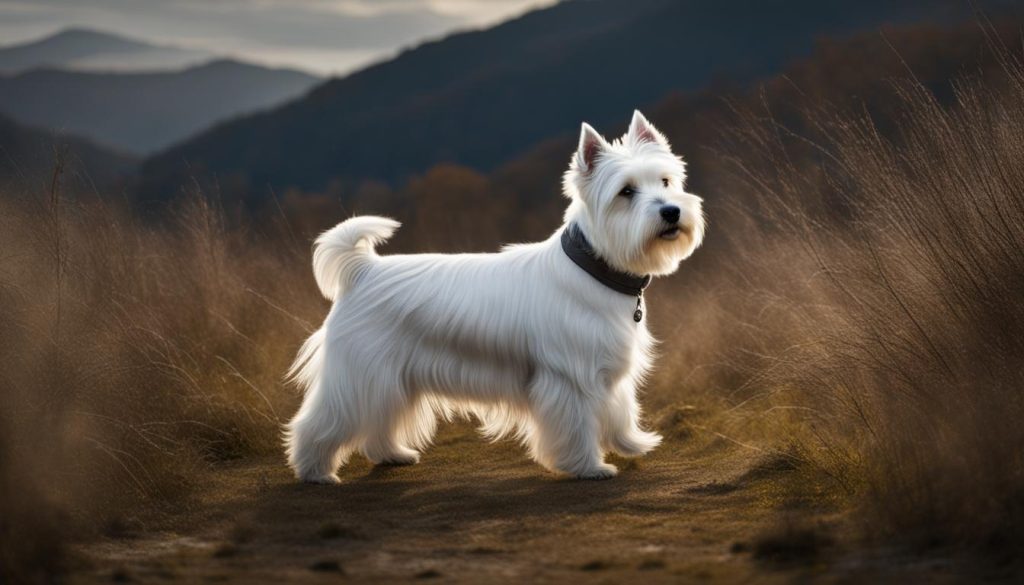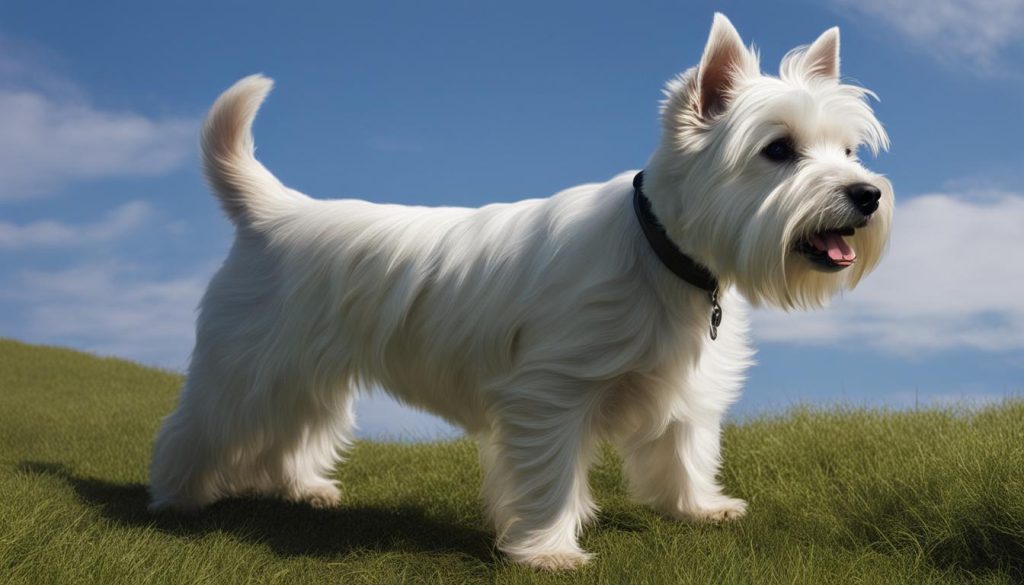The West Highland White Terrier, or Westie, is a small terrier breed known for its charming personality and unique traits. They are confident and self-assured dogs that are full of life and personality. With their medium-length white coat, dark eyes, and black nose, Westies have a distinct and adorable appearance. They were originally bred for hunting purposes but have become popular as family pets due to their affectionate nature and playful disposition. Westies are known for their intelligence, loyalty, and love of playtime, making them fantastic companions for individuals and families alike.
Key Takeaways:
- West Highland White Terriers have a charming and confident personality.
- They have a distinctive appearance with their white coat, dark eyes, and black nose.
- Originally bred for hunting, Westies have become popular as family pets.
- They are intelligent, loyal, and enjoy playtime.
- Westies make fantastic companions for individuals and families.
West Highland White Terrier Size and Weight
The West Highland White Terrier, also known as the Westie, is a small and compact dog breed. They typically measure around 10-11 inches in height at the shoulder, making them a perfect fit for both indoor and outdoor living environments. Despite their small size, Westies possess a sturdy build with a deep chest, giving them a robust and strong appearance.
When it comes to weight, Westies typically range between 13-20 pounds. However, individual dogs may vary slightly in size and weight. Their muscular physique contributes to their overall weight, reflecting their active and energetic nature.
For a visual representation of the West Highland White Terrier size and weight, refer to the table below:
| Size | Height at Shoulder | Weight |
|---|---|---|
| Small | 10-11 inches | 13-20 pounds |
The table provides an overview of the typical size and weight range for West Highland White Terriers, offering useful information for individuals considering this delightful breed as a pet.
West Highland White Terrier Size FAQs
- Do Westies stay small?
- How much do Westies weigh?
- What is the average height of a West Highland Terrier?
- Can Westies adapt to apartment living due to their small size?
The table and FAQs aim to provide a comprehensive understanding of the size and weight characteristics of the West Highland White Terrier. This knowledge empowers potential owners to make informed decisions regarding the suitability of this breed for their lifestyle and living arrangements.
West Highland White Terrier Coat and Grooming

The West Highland White Terrier has a medium-length double coat that is dense and harsh in texture. Their coat is predominantly white, which gives them their distinctive appearance. Grooming a Westie involves regular brushing to remove loose hair and prevent tangles. Some owners choose to have their Westie’s coat clipped every few weeks, which can make it softer and curlier. Additionally, they should be bathed every four to six weeks and have their nails trimmed regularly. Proper grooming is important to maintain the health and appearance of their coat.
Regular brushing is essential for a Westie’s coat. It helps to remove loose hair, prevent matting, and keep the coat looking clean and healthy. A slicker brush or a comb with wide-spaced teeth is usually recommended for grooming a West Highland White Terrier. This helps to penetrate the dense coat and remove any tangles or knots.
When bathing a Westie, it’s important to use a shampoo that is specifically formulated for dogs. This helps to maintain the natural balance of the skin and coat. After bathing, it’s important to thoroughly dry the Westie’s coat to prevent any moisture from getting trapped against the skin, which can lead to skin problems.
Grooming Tips for West Highland White Terriers:
- Brush the coat at least once a week to remove loose hair and prevent matting.
- Consider regular clipping to keep the coat shorter and more manageable.
- Bathe the Westie every four to six weeks using a dog-specific shampoo.
- Trim the nails regularly to prevent overgrowth and discomfort.
- Clean the ears regularly to prevent infections.
Common Coat Problems in West Highland White Terriers:
Despite their dense and harsh coat, Westies can still experience certain coat problems. Some common issues include:
- Skin allergies: Westies may develop allergies to certain environmental factors or food ingredients, which can lead to itching and skin irritation.
- Hot spots: Hot spots are areas of inflamed and infected skin that can occur due to excessive scratching or licking. Regular grooming and keeping the coat clean can help prevent hot spots.
- Matting: If the coat is not regularly brushed and maintained, it can develop mats or tangles, which can be uncomfortable for the Westie and may require professional grooming to remove.
By following proper grooming practices and addressing any coat issues promptly, owners can help their Westies maintain a healthy and beautiful coat.
West Highland White Terrier Personality Traits

The West Highland White Terrier, or Westie, is a breed known for its distinct personality traits. These traits contribute to their charm and make them beloved companions for many families. Understanding the personality of a Westie can help potential owners determine if this breed is the right fit for their lifestyle.
Intelligence and Independence
Westies are intelligent dogs that can sometimes exhibit independent behavior. While they are eager to please their owners, they may also have a stubborn streak. This combination of intelligence and independence requires consistent training and positive reinforcement techniques to ensure they become well-behaved dogs.
Affectionate and Loyal
Despite their independent nature, Westies are also known for their affectionate and loyal personalities. They form strong bonds with their families and enjoy spending time with them. Whether it’s cuddling on the couch or accompanying their owners on walks, Westies thrive on the love and attention they receive from their human companions.
Playful and Energetic
West Highland White Terriers have a playful and energetic disposition. They enjoy engaging in various activities, such as playing fetch, chasing toys, or participating in agility training. Regular exercise and mental stimulation are important for their well-being and can help prevent behavioral issues.
Overall, Westies are smart, affectionate, and energetic dogs with unique personalities. They require proper training, socialization, and exercise to thrive in a family environment. Their intelligence and independent nature combined with their loyalty and playful disposition make them wonderful companions for individuals or families who can provide them with the love and attention they deserve.
West Highland White Terrier Exercise and Energy Level

When it comes to exercise, West Highland White Terriers have a moderate energy level that requires regular physical activity to keep them happy and healthy. These energetic little dogs benefit from at least 30 minutes of exercise per day. Taking them for walks or engaging in play sessions in a securely fenced area is a great way to ensure they get the exercise they need.
For those looking to add an extra challenge to their Westie’s exercise routine, participating in dog sports like obedience, agility, and earth dog trials can provide mental stimulation and physical exercise. These activities allow Westies to utilize their intelligence and natural instincts while also deepening the bond between dog and owner.
It is important to note that Westies are active dogs with a playful nature, and regular exercise helps prevent behavioral issues that may arise from pent-up energy. By providing them with opportunities for physical and mental stimulation, owners can help ensure that their West Highland White Terriers live happy and balanced lives.
Exercise Requirements
| Exercise requirements for West Highland White Terriers | Description |
|---|---|
| Duration | At least 30 minutes of exercise per day |
| Type of exercise | Walks, play sessions in a secure area, dog sports |
| Benefits | Maintains physical health, prevents behavioral issues, deepens the bond between dog and owner |
Regular exercise is not only essential for physical health but also helps to keep Westies mentally stimulated. It provides an outlet for their energy and helps prevent boredom, which can lead to destructive behavior. By understanding and meeting the exercise needs of West Highland White Terriers, owners can ensure that their furry friends lead happy and fulfilling lives.
West Highland White Terrier Training and Socialization

Training and socialization are essential for West Highland White Terriers to become well-behaved and well-adjusted dogs. As an intelligent and eager-to-please breed, Westies respond well to creative and positive training methods. However, their independent and stubborn nature may require a firm hand and consistent reinforcement. Starting training from a young age is crucial to establish good behavior habits.
When it comes to socialization, Westies need to be exposed to different people, animals, and environments early and continuously. This exposure helps them develop proper social skills and prevents them from becoming aggressive or fearful toward strangers or other animals. Taking them to obedience classes, puppy playdates, and dog parks can be effective ways to socialize your Westie and ensure they grow up to be friendly and well-rounded companions.
The Benefits of Training and Socializing Your Westie
Proper training and socialization have several positive effects on West Highland White Terriers. First, it helps them understand boundaries and become obedient pets. Consistent training and reinforcement will ensure that they respond to commands and behave well in various situations. Moreover, socialization helps build their confidence and reduces anxiety or fearfulness in new environments or around unfamiliar people or animals. A well-trained and well-socialized Westie is more likely to be a happy, calm, and enjoyable companion.
By investing time and effort in training and socializing your West Highland White Terrier, you are setting the foundation for a healthy and fulfilling relationship with your furry friend. Remember to remain patient, positive, and consistent throughout the training process, and seek professional guidance if needed. With the right training and socialization, your Westie can blossom into a well-behaved and beloved member of your family.
History and Origin of the West Highland White Terrier

The West Highland White Terrier, often referred to as the Westie, has a fascinating history that dates back to the 18th century in Scotland. These delightful little dogs were originally bred for hunting purposes, specifically to rid estates of rodents. Their small size, intelligence, and tenacity made them well-suited for this task.
One of the defining features of the West Highland White Terrier is its distinctive white coat, which helps them stand out against their prey. The breed’s name has changed over time, but their coat color has remained a constant. In the early days, Westies were often referred to as Poltalloch Terriers, after the estate owned by Colonel Edward Donald Malcolm. It wasn’t until the early 20th century that the breed became officially recognized as the West Highland White Terrier.
The Westie’s popularity quickly spread beyond Scotland and gained recognition worldwide. In 1908, the breed was officially recognized by the American Kennel Club, solidifying its place among other beloved dog breeds in the United States. Today, Westies are cherished for their intelligence, lively personality, and distinctive appearance, making them excellent companions for individuals and families alike.
Table: West Highland White Terrier Historical Timeline
| Year | Event |
|---|---|
| 1700s | West Highland White Terriers breed for hunting purposes |
| 1800s | Referred to as Poltalloch Terriers |
| Early 20th century | Officially recognized as West Highland White Terriers |
| 1908 | Recognized by the American Kennel Club |
Throughout their history, West Highland White Terriers have captivated dog lovers with their charm, intelligence, and hunting abilities. Their journey from the Scottish estates to homes around the world is a testament to their enduring appeal and adaptability as both working dogs and beloved companions.
West Highland White Terrier Health Considerations

As with any breed, West Highland White Terriers are prone to certain health issues that owners should be aware of. Regular veterinary check-ups are essential for maintaining their overall health and well-being.
One common health concern in Westies is cataracts, which can cause vision impairments or even blindness if left untreated. Another issue to watch out for is allergies, which can manifest as skin irritations or respiratory problems. Additionally, Westies are prone to ear infections due to their floppy ears, so regular ear cleaning and maintenance are necessary to prevent infections.
It’s important to provide your Westie with a balanced diet to support their overall health and immune system. Obesity can lead to various health problems, so portion control and regular exercise are crucial in preventing weight gain. Regular grooming, including brushing their teeth and trimming their nails, is also important to maintain their well-being.
| Common Health Issues in West Highland White Terriers | Preventive measures |
|---|---|
| Cataracts | Regular veterinary check-ups, early treatment if detected |
| Allergies | Identify and avoid allergens, consult with a veterinarian for treatment options |
| Ear infections | Regular ear cleaning, proper grooming |
| Obesity | Portion control, regular exercise |
| Overall well-being | Balanced diet, regular veterinary care, grooming |
Please be aware that while these health issues are common in Westies, not all individuals will experience them. Responsible breeding practices and proper care can help minimize the risk of these health problems. By being proactive in their healthcare and providing them with a loving and nurturing environment, you can ensure that your West Highland White Terrier leads a happy and healthy life.
Finding a West Highland White Terrier

If you’re interested in adding a West Highland White Terrier to your family, there are multiple options to consider. Adopting from a rescue organization or a shelter is a wonderful way to provide a loving home to a dog in need. Many Westies can be found in animal shelters and breed-specific rescue groups.
If you choose to purchase a Westie puppy, it’s important to find a reputable breeder. Thorough research should be conducted to ensure the breeder follows ethical practices, prioritizes the well-being of their dogs, and conducts necessary health screenings.
By adopting or purchasing from a responsible source, you can welcome a healthy and happy Westie into your home.
When searching for a West Highland White Terrier breeder, consider the following factors:
1. Reputation and Accreditation
- Look for breeders who are members of reputable canine organizations and adhere to their code of ethics.
- Check for positive reviews and testimonials from previous customers.
2. Health Testing
- Inquire about the health testing that the breeder conducts on their breeding dogs, such as hip and elbow evaluations, eye examinations, and genetic testing for known breed-specific conditions.
3. Breeding Practices
- Ask the breeder about their breeding program, including how often they breed their dogs, how they socialize their puppies, and the steps they take to ensure the overall well-being of their dogs.
4. Contract and Guarantees
- Review the breeder’s sales contract to understand their policies regarding health guarantees, returns, and ongoing support.
- Ensure that the breeder provides proper documentation and registration papers for the puppy.
Remember, responsible breeders prioritize the health and welfare of their dogs above all else. By choosing a reputable breeder or adopting from a rescue organization, you can find a West Highland White Terrier that will bring joy and companionship to your life.
Wrapping Up
To summarize, the West Highland White Terrier, or Westie, is a delightful breed known for its charming personality and unique traits. With their confident and self-assured nature, they make excellent companions for individuals and families alike. Their intelligence, loyalty, and love of playtime contribute to their overall appeal.
When considering a Westie as a family pet, it’s important to remember that they require regular exercise and mental stimulation to keep them happy and well-behaved. Training and socialization from a young age are crucial to ensure they develop good habits and proper social skills.
Whether you choose to adopt from a rescue organization or purchase from a reputable breeder, providing a loving home to a West Highland White Terrier is rewarding. With their lively and playful nature, Westies can bring joy and laughter into your life for many years to come.
FAQ
Are West Highland White Terriers good family pets?
Yes, Westies are known for their affectionate nature and make great companions for individuals and families.
How big do West Highland White Terriers get?
Westies typically measure around 10-11 inches tall at the shoulder.
What is the grooming routine for a West Highland White Terrier?
Regular brushing, occasional coat clipping, bathing every four to six weeks, and nail trimming are important parts of Westie grooming.
Are Westies easy to train?
Westies are intelligent and eager to please, but they can be a bit stubborn. Positive reinforcement training methods work best with them.
How much exercise do West Highland White Terriers need?
Westies benefit from at least 30 minutes of exercise per day, such as walks or play sessions in a securely fenced area.
Do West Highland White Terriers get along with other dogs?
While they can get along with other dogs they have been raised with, Westies may not always be friendly towards unfamiliar dogs.
What is the history of the West Highland White Terrier?
Westies originated in Scotland in the 1700s and were originally bred for hunting and rodent extermination on estates.
What are some common health concerns in West Highland White Terriers?
Westies can be prone to cataracts, allergies, and ear infections. Regular veterinary check-ups and preventive care are important.
Where can I find a West Highland White Terrier?
Westies can be adopted from rescue organizations or shelters. If purchasing a puppy, it’s important to find a reputable breeder.






